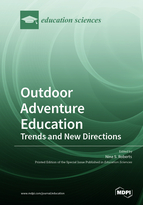Outdoor Adventure Education: Trends and New Directions
A special issue of Education Sciences (ISSN 2227-7102).
Deadline for manuscript submissions: closed (1 October 2020) | Viewed by 36804
Special Issue Editor
Interests: outdoor programming and leadership; adventure education; youth development; outreach and community engagement; constraints and barriers to visiting parks and public lands; an authority on race; culture and gender issues in parks/protected areas and outdoor recreation
Special Issue Information
Dear Colleagues,
As the field of outdoor recreation and adventure education continues to grow and expand, the need to keep up with trends and innovative practices is ubiquitous. In 2020, Education Sciences will be producing a Special Issue on outdoor adventure. Education Sciences is a peer reviewed, scholarly open access journal managed by MDPI (e.g., open scientific exchange in all forms, across all disciplines). Over 200 MDPI journals are supported by more than 35,000 academic editors. Scholars from around the world benefit from the latest research, freely available, distributed under proper license, and strict ethnical policies enforcing rigorous peer-review standards serving the scientific community for 23 years.
As explicitly stated, MDPI maintains the following three conditions: (1) peer-reviewed literature is freely available without subscription or price barriers; (2) literature is immediately released in open access format, and (3) published material can be re-used without obtaining permission as long as a correct citation to the original publication is given (i.e., https://bit.ly/2WfF3E9)
The overall focus, scope, and purpose of this Special Issue on outdoor adventure is to provide the current and anticipated future trends; offer innovative ideas for new programs; support decision making for managers to move plans and intentions into action; inspire pioneering staff training and leadership development; incite policy reviews and revisions; promote resource (re)allocation where needed; and stimulate culture shifts among outdoor leaders and managers.
Furthermore, this Special Issue will be situated within the existing literature by depicting major trends in the field, exploring organizational issues and successes, identifying gaps between research and practice, and formulating solutions to some of the fields’ most pressing challenges. Of particular interest are manuscripts reporting:
• Adventure education across diverse cultures
• Innovative partnerships for experiential education outdoors
• Land management agencies working with adventure education programs
• Leadership and/or management issues and challenges
• Programming advances, participation trends
• Recruitment and retention of diverse staff; workforce enhancement
• Social groups/identity and outdoor spaces (e.g., people of color and outdoor adventure; women in the outdoors—where have we been, where are we going?; LGBTQ trends and future directions; youth and outdoor adventure)
• Socioeconomic factors and solutions
• Technology influences and adventure education
• Working with schools/school districts and being in sync with curriculum needs, supporting transportation challenges, etc.
If more than five manuscripts are of exceptional value and quality, there is a possibility this Special Issue could be considered as an edited book.
Sample References:
- Adventure Travel Trade Association (2018). 20 adventure travel trends to watch in 2018. ATTA Research report, 45pp. Available: https://bit.ly/32PT0uF
- Attarian, A. (2001). Trends in outdoor adventure education. Journal of Experiential Education, 24(3), 141-149.
- Bobilya, A.J., Holman, T., Lindley, B. & McAvoy, L.H. (2010). Developing Trends and Issues in U.S Outdoor and Adventure-Based Programming. Journal of Outdoor Recreation, Education, and Leadership, 2(3), 301-321.
- Ewert, A.W. & Sibthorp, J. (2014). Outdoor adventure education: Foundations, theory, and research. Champaign, IL: Human Kinetics.
- Gray, T. & Mitten, D. (Eds.) (2018). The Palgrave International Handbook of Women and Outdoor Learning. London:Springer Nature/Palgrave Macmillian. https://0-doi-org.brum.beds.ac.uk/10.1007/978-3-319-53550-0
- Mcphie, J. (2014). Controversial issues in adventure programming. Journal of Adventure Education and Outdoor Learning, 14(3), 262-264. https://0-doi-org.brum.beds.ac.uk/10.1080/14729679.2013.870820
- Miles, J.C. & Priest, S. (Eds) (1999). Adventure programming. State College, PA: Venture. (ERIC Number: ED444811).
Dr. Nina S. Roberts
Guest Editor
Manuscript Submission Information
Manuscripts should be submitted online at www.mdpi.com by registering and logging in to this website. Once you are registered, click here to go to the submission form. Manuscripts can be submitted until the deadline. All submissions that pass pre-check are peer-reviewed. Accepted papers will be published continuously in the journal (as soon as accepted) and will be listed together on the special issue website. Research articles, review articles as well as short communications are invited. For planned papers, a title and short abstract (about 100 words) can be sent to the Editorial Office for announcement on this website.
Submitted manuscripts should not have been published previously, nor be under consideration for publication elsewhere (except conference proceedings papers). All manuscripts are thoroughly refereed through a double-blind peer-review process. A guide for authors and other relevant information for submission of manuscripts is available on the Instructions for Authors page. Education Sciences is an international peer-reviewed open access monthly journal published by MDPI.
Please visit the Instructions for Authors page before submitting a manuscript. The Article Processing Charge (APC) for publication in this open access journal is 1800 CHF (Swiss Francs). Submitted papers should be well formatted and use good English. Authors may use MDPI's English editing service prior to publication or during author revisions.
Keywords
- outdoor education leadership
- program innovations
- participation trends
- technology
- public–private partnerships
- recruitment and retention
- justice, equity, diversity and inclusion
- economics
- risk management
- evaluation
- health benefits






